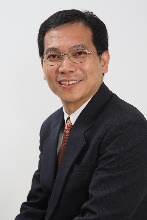Invited Speakers

Prof. Kin-Leong Pey
Associate Provost (Undergraduate Studies and SUTD Academy), Singapore University of Technology and Design
Title: New Insights into Dielectric Breakdown of MgO in STT-MRAM Devices
Abstract: In a comprehensive analytical study of dielectric breakdown of ultra-thin MgO in 28 nm embedded MRAM (eMRAM) test chips, it was observed that breakdown in MgO is polarity dependent, and that device lifetime is reduced for bipolar stress. Furthermore, it was found that the breakdown trend substantially deviates from the Poisson area scaling law; this deviation can be attributed to self-heating in larger area devices. Further investigation of breakdown also reveals that self-heating effects are predominantly observed at lower frequencies; percolation paths exhibit fast transient (thermal runaway) temperatures; and that breakdown statistics are poorly represented by the standard Weibull model.
Biography: Prof. Kin-Leong PEY is currently the Associate Provost (Undergraduate Studies and SUTD Academy) and a Professor at the Singapore University of Technology and Design. Kin-Leong was appointed by the Singapore Ministry of Education to take up the current SUTD position in 2010. He was previously the Head of the Microelectronics Division, Director of the Nanyang NanoFabrication Center and Director of the Microelectronic Centre in the School of EEE at the Nanyang Technological University. A senior member of IEEE and an IEEE Electron Devices Society Distinguished Lecturer, Kin-Leong was the General Chair of IPFA2001, Singapore and the co-General Chair of IPFA2004, Taiwan. Kin Leong is a Fellow of the ASEAN Academy of Engineering & Technology and the Institute of Engineer, Singapore . He is an Editor of IEEE Transactions on Devices and Materials Reliability. Kin-Leong has published 208 international refereed publications, 6 book chapters, 221 technical papers at international meetings or conferences, 68 invited talks including 4 keynote speeches and holds 39 US patents. He has supervised 32 PhD and more than 15 Master research theses.